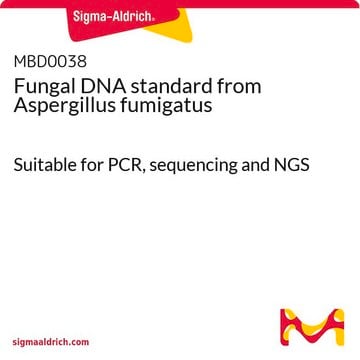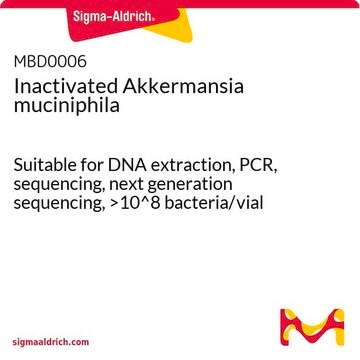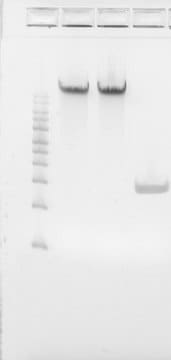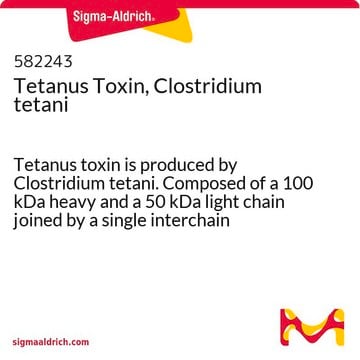MBD0036
Microbial DNA standard from Vibrio harveyi
Suitable for PCR, sequencing and NGS
Anmeldenzur Ansicht organisationsspezifischer und vertraglich vereinbarter Preise
Alle Fotos(1)
About This Item
UNSPSC-Code:
41105500
NACRES:
NA.51
Empfohlene Produkte
Qualitätsniveau
Form
liquid
Zusammensetzung
, 10 ng/μL
Methode(n)
FISH: suitable
Versandbedingung
ambient
Lagertemp.
−20°C
Allgemeine Beschreibung
Standardization of sample analysis is currently needed in microbiome genomics research workflow. Lack of standardization can lead to biases and errors in common processes during sample preparation and analysis such as sample amplification, sequencing and bioinformatics analyses.1 Vibrio Harveyi genomic DNA microbial standard can serve as standard for benchmarking the performance along the workflow of microbiomics or meta-genomics analyses and as a tool to increase reproducibility and allow comparison of results obtained by different labs.
Since V. Harveyi is not a typical resident of the human microbiota it can serve as a spike-in standard in human microbiota genomics workflow analysis.
V. harveyi is a gram negative, rod-shaped, motile, heterotrophic marine luminous pathogen bacterium that widely inhabits natural aquatic environments. It belongs to the family Vibrionaceae of class Gammaproteobacteria 2, known as a serious bacterial pathogen of marine fish and invertebrates, including penaeid shrimp in aquaculture 2,3.
V. harveyi has the ability to regulate gene expression by quorum sensing. Current research 4,5,6 demonstrates 3 regulatory molecules that mediate quorum sensing in in V. harveyi; homoserine lactone (HAI-1) , a furanosyl borate diester (AI-2) and cholerae autoinducer 1 (CAI-1). The quorum sensing pathway that regulates bioluminescence, biofilm formation and other virulence factors in V. harveyi is very similar to the pathway that regulates virulence factor expression in Vibrio cholerae, 7, 8 making V. harveyi an important model system for human health research.
Since V. Harveyi is not a typical resident of the human microbiota it can serve as a spike-in standard in human microbiota genomics workflow analysis.
V. harveyi is a gram negative, rod-shaped, motile, heterotrophic marine luminous pathogen bacterium that widely inhabits natural aquatic environments. It belongs to the family Vibrionaceae of class Gammaproteobacteria 2, known as a serious bacterial pathogen of marine fish and invertebrates, including penaeid shrimp in aquaculture 2,3.
V. harveyi has the ability to regulate gene expression by quorum sensing. Current research 4,5,6 demonstrates 3 regulatory molecules that mediate quorum sensing in in V. harveyi; homoserine lactone (HAI-1) , a furanosyl borate diester (AI-2) and cholerae autoinducer 1 (CAI-1). The quorum sensing pathway that regulates bioluminescence, biofilm formation and other virulence factors in V. harveyi is very similar to the pathway that regulates virulence factor expression in Vibrio cholerae, 7, 8 making V. harveyi an important model system for human health research.
Anwendung
Suitable as a standard for PCR, Sanger and next generation sequencing (NGS).
Leistungsmerkmale und Vorteile
- Individual microbial standard for microbiomics and meta-genomics workflow
- Suitable standard for PCR, Sanger sequencing and 18S NGS
- Improves bioinformatics analyses
- Increases reproducibility and repeatability
- Identity and purity of the genomic V. harveyi DNA has been confirmed by 18S NGS and gel electrophoresis
Physikalische Form
The genomic DNA is provided in at ≥10 ng/μl concentration in TE buffer pH 8.0.
Sonstige Hinweise
It is recommended to avoid freeze thaw cycles of this product
Lagerklassenschlüssel
12 - Non Combustible Liquids
WGK
WGK 1
Analysenzertifikate (COA)
Suchen Sie nach Analysenzertifikate (COA), indem Sie die Lot-/Chargennummer des Produkts eingeben. Lot- und Chargennummern sind auf dem Produktetikett hinter den Wörtern ‘Lot’ oder ‘Batch’ (Lot oder Charge) zu finden.
Besitzen Sie dieses Produkt bereits?
In der Dokumentenbibliothek finden Sie die Dokumentation zu den Produkten, die Sie kürzlich erworben haben.
Artikel
DNA standards enhance metagenomics research integrity, offering precise species study and mixed community standards.
Unser Team von Wissenschaftlern verfügt über Erfahrung in allen Forschungsbereichen einschließlich Life Science, Materialwissenschaften, chemischer Synthese, Chromatographie, Analytik und vielen mehr..
Setzen Sie sich mit dem technischen Dienst in Verbindung.








